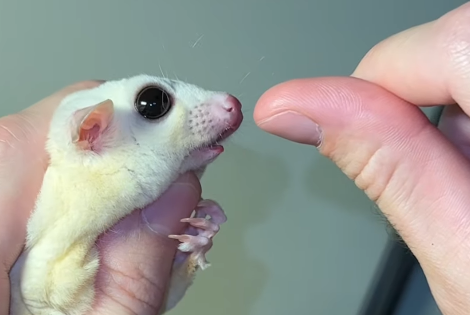
Do Sugar Gliders Bite and How Can You Prevent It?
Do Sugar Gliders Bite? If you’re a sugar glider owner or considering getting one, this question might be on your mind. The truth is biting is often a form of communication for them. Read on to learn how to interpret their behavior and ensure a happy relationship with your pet.
1. Do Sugar Gliders Bite?
Unfortunately, the answer is YES! These small creatures can exhibit some challenging behavior, including biting. While sugar glider biting can be alarming, it’s crucial to understand that it’s a natural behavior that can stem from various causes. Let’s look at some of them and potential solutions.
2. Why Does My Sugar Glider Bite Me?
2.1. Fears
Sugar gliders are prey animals, meaning they are naturally cautious and may bite when feeling threatened. If approached too quickly or aggressively, they might react defensively.
How to Prevent Fear Biting:
- Approach your sugar glider slowly and calmly.
- Avoid sudden movements or loud noises.
- Spend time bonding with them through regular interaction, offering treats to build trust.
2.2. Playfulness
Sometimes, biting isn’t about aggression but stems from play. Sugar gliders, being curious and energetic, may nip as part of their exploration or excitement.
How to Manage Playful Biting:
- Provide sufficient toys and playtime to channel their energy.
- Redirect biting behavior with toys or treats.
- Establish boundaries and teach them what’s acceptable.
2.3. Health Issues
Sugar Gilders might bite when experiencing pain or discomfort due to health problems such as dental issues, infections, or injuries.
What to Do:
- Regularly monitor your sugar glider’s health and behavior.
- If biting seems linked to unusual irritability or physical symptoms, consult a qualified exotic pet veterinarian immediately.
2.4. Aggression
Sugar gliders can exhibit aggressive behavior, especially males during mating seasons or when they feel their territory is being invaded. Aggression may also arise from conflicts with other sugar gliders.
How to Handle Aggression:
- Identify and remove potential triggers, such as overcrowding or lack of resources.
- Separate sugar gliders if they fight frequently.
- Reinforce positive behaviors by rewarding calm interactions.
3. What Happens if a Sugar Glider Bites You?
Here are some potential dangers associated with a sugar glider bite:
- Bite Severity: Sugar glider bites are rarely severe. They range from gentle nibbles to harder bites that may break the skin.
- Infection Risk: If a bite breaks the skin, there is a risk of bacterial infection. Clean the wound thoroughly and monitor for signs of redness, swelling, or pain.
- Allergic Reactions: Though rare, some people may develop minor allergic reactions to sugar glider saliva.
4. How Do I Get My Sugar Glider to Stop Biting?
Here are some practical tips to help you manage sugar glider biting:
- Bonding and Socialization: Spend time bonding with your sugar glider to build trust. Use bonding pouches or spend time with them during their active hours.
- Handle Gently: Always approach your sugar glider slowly and avoid startling them.
- Recognize Triggers: Learn their body language to identify signs of discomfort or stress and avoid provoking situations.
- Avoid Hand Feeding: Use utensils or place food in their cage to prevent them from associating your hand with food.
- Positive Reinforcement: Reward calm and non-biting behavior with treats or affection.
Now you know the answer to “Do Sugar Gliders Bite?”. While they may bite occasionally, understanding their behavior and building trust can help minimize this issue, ensuring a happier relationship with your pet. With patience, training, and consistency, you can enjoy a long and rewarding relationship with your sugar glider.




